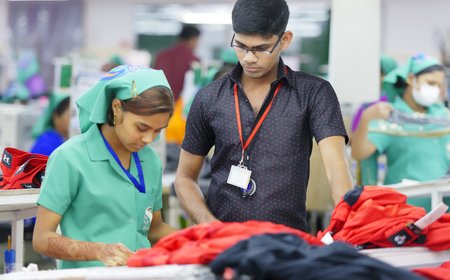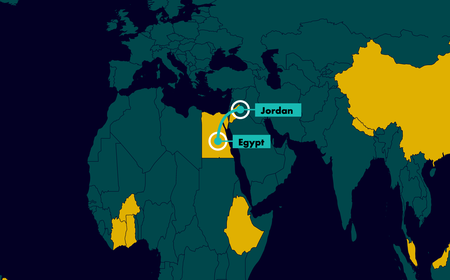In 2001, Jordan and the United States ratified a Free Trade Agreement (FTA) to establish "Qualifying Industrial Zones" (QIZs) on Jordanian territory. The QIZs give unfettered access to the U.S. market for goods manufactured in these zones. The agreement does not include any time limits, renewal requirements or termination date. At first glance, the FTA appears to have no relevance to migration as it seeks to give the following tools for sustainable development:
- Employment opportunities for Jordanians in rural areas.
- Promote the peace process between Jordan and Israel, building on the 1985 FTA between the United States and Israel. The agreement allowed products with a specified amount of Israeli content to enter the United States duty-free.
- Support of economic reform in Jordan
Factories in these zones produce mainly garments, in addition to other goods, such as rubber, refined metals, chemical products, leather goods, and processed food. Due to the FTA, factories enjoy several benefits and advantages including tax benefits and full restoration of capital, profits and salaries as well as exemption from customs tariffs. Jordanians were anticipated to work in these factories, hence reducing the youth unemployment rate. This was emphasized by the government in order to justify the establishment of these zones and deflect criticism of normalizing commercial relations with Israel.
What happened
According to the Jordanian Ministry of Labour (2022), 70,000 workers work in these zones. However only 29.2% of the workers are Jordanians; the remainder are primarily migrant workers from Sri Lanka, Vietnam, Bangladesh, China, Pakistan, and Nepal. 75% of employees are women. With few exceptions, factory owners are non-Jordanians who serve the demands of American companies while taking advantage of the tax concessions afforded by QIZs.
In other words, the QIZs have morphed into a migration hub for unskilled jobs unrequested by the Jordanian market, hence failing to serve the primary goals of its establishment. This was confirmed by numerous scientific studies that have been conducted on QIZs frequently to assess their quantitative and macroeconomic influence on economic growth, the balance of payments, and job creation, or to examine their role promoting peace with "Israel".
Why Jordanians avoid working in QIZs
Due to the abuse and harassment committed by factory supervisors, the QIZs have acquired a negative reputation. Jordanian workers are less at risk than migrants, but abuse has created hatred against these enterprises and made it difficult for the government to attract Jordanian labour. The personality of the “active” and “disciplined” migrant worker who works in these areas is put forward by employers and in public discourse in Jordan, to denounce the “laziness” and “lack of discipline” of the Jordanian worker.
Minimum wage directives exclude garment workers. They receive around 310 USD, while the minimum wage in Jordan is 367 USD. In exchange for providing food and housing, employers deduct further from their pay. Thus migrant workers end up earning 177 USD as their monthly salary.
There are reports of grave allegations of systematic mistreatment of migrant workers in factories operating in Jordan's QIZs. The situation was characterized as human trafficking and involuntary slavery. By failing to renew their employment and residency permits or by unjustly accusing them of committing an offense, several factory administrations orchestrated the deportation of workers who demanded their rights and organised sit-ins or strikes. The workplace and residence lack a healthy environment, as evidenced by overcrowding, the spread of dust and dirt, and the absence of sufficient ventilation. In addition, they face wage retention or nonpayment, confiscation of identification documents, restricted freedom of movement, unsafe living conditions, long hours without rest, isolation, and verbal and physical abuse. Incidents of suicide of female migrant workers in these zones is reported due to inhuman working conditions. This also explains why Syrian refugees do not wish to work in QIZs.
Efforts for improvements
The Jordanian government has acknowledged these violations, but their efforts to address them are modest. Since Jordan has not yet ratified ILO Convention No. 87 on the Freedom of Association and Protection of the Right to Organize, all factories in Jordan continue to be non-compliant with regards to workers' freedom to create and join unions. In addition, despite the fact that the industry has approved a number of Collective Bargaining Agreements (CBA) to promote worker rights, 81% of factories have failed to properly execute all CBA provisions.
The situation in QIZ is responsible for Jordan's low placement in international rankings relating to human trafficking and slavery. Jordan does not currently meet the minimal requirements for the abolition of human trafficking and other forms of forced labor, although it is making substantial efforts to do so.
Moving forward
The Jordanian government appears to have an urgent need to reconsider the situation of QIZs, as the practical reality has demonstrated that these zones have become a location where the rights of migrant workers are violated. Numerous analysts also dispute its economic viability due to the exemptions enjoyed by investors in this territory, which deprive the state of taxes and fees, and the duty-free importation of goods from Jordan into the American market. If the primary objective is to provide employment chances for Jordanians in rural places, the Ministry of Labour's statistics demonstrate the reverse.



